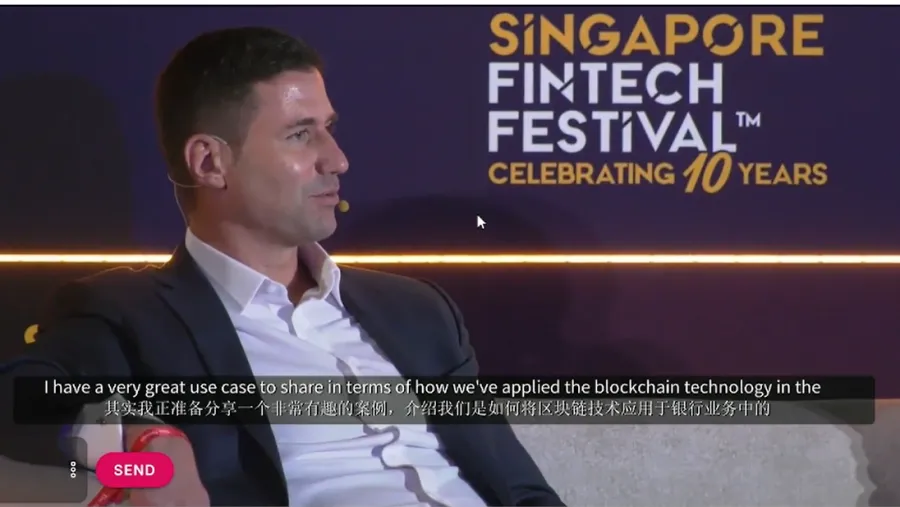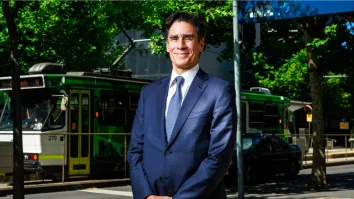
From apps to ambient: banks urged to embrace 'invisible finance'
Industry players are integrating services into everyday devices and platforms.
Neo banks and traditional lenders are moving beyond app-based services to ‘invisible finance’, where payments, credit, and savings functions are integrated directly into consumer devices and everyday platforms.
The shift—often described as Banking-as-a-Service (BaaS) 2.0—positions banking infrastructure to operate in the background of digital ecosystems, industry leaders said during a panel discussion at the Singapore FinTech Festival 2025, held on the Frontier Stage on 12 November.
ClearBank UK CEO Emma Hagan said neobanks depend on fast, resilient systems to stay competitive. “As soon as payments slow, the customer experience suffers—and that makes it hard to compete,”
Paymentology CEO Jeff Parker said technology remains a key differentiator because it allows banks to deliver products more efficiently and respond to customer needs faster. “It’s what gives us agility and helps prevent today’s digital systems from becoming tomorrow’s legacy.”
The current BaaS model builds on previous efforts to let fintechs connect to banking systems, but with a stronger focus on automation and compliance.
“[The technology] is already embedded in smartphones, wearables, cars, and homes,” according to KASIKORNBANK CEO Kattiya Indaravijaya. “The service already runs autonomously in the backbone.”
Banks are also simultaneously investing in artificial intelligence (AI), blockchain technology, and quantum computing to improve efficiency and security, said Bojan Obradovic, Group Head of Innovation & Digital Partnerships, HSBC. “Alongside these technological shifts, there is also a generational change.”
“Within the next decade, Gen Z—the first truly digitally native generation—will represent the largest global share of wealth,” Obradovic said. “Their expectations for engaging with banks and services will be fundamentally different from previous generations.”
“There’s also a big opportunity in the SME space, embedding workflows and automation tools within software,” Parker added.
In markets like the Middle East, embedded-finance partnerships are already driving competition. In Saudi Arabia, for instance, the country’s second-largest bank by client numbers is a neobank founded less than two years ago.
In line with this, traditional lenders are also responding by investing in ventures and forming strategic partnerships.
“What started as ad-hoc partnerships is now formalised through corporate venture capital,” Martin Blechta, Partner, BCG, said, adding that more funding for fintechs is now coming directly from incumbent banks rather than independent venture firms.
Whilst Neo banks are entering as non-traditional competitors, other non-bank players, such as stablecoin issuers, are expanding into more traditional payment services, Obradovic added.
Here’s a snippet of the panel discussion below:
Blechta: What is one key trend to watch in the neobanking space over the coming years?
Obradovic: I was just about to share a great use case of how we've applied blockchain technology in the banking space—something that might not be expected from a traditional bank. In some respects, I think we’ve surprised the market. A couple of years ago, HSBC issued a tokenised gold offering on a blockchain platform, which is now the third-largest gold token in the world.
One point I emphasise is that the most critical skill right now is the ability to continuously learn and keep up with the pace of change. All of these technologies are going to impact the financial services industry, and more broadly, our daily lives. At some point, we will likely outsource aspects of our personal lives to AI. When that happens, even our daily routines will change, so the ability to adapt and keep up will be essential for success.
Hagan: I don’t think traditional banks will be competed with by digital banks in the future. Rather, digital banks will define what “good” looks like for the market. They will set the standard for what a traditional bank needs to be, because people will expect the resiliency, scalability, innovation, and agility that digital banks deliver. That will become the new norm.
As a trend, this shows how digital banks will lead in the market. If we can future-proof the ecosystem to support this, it should deliver real value to our clients and the markets we aim to serve.
Parker: I agree with that. Thinking further, I believe digital banks will drive the next phase of Banking-as-a-Service. The new technology Emma mentioned earlier will enable players to deliver banking services seamlessly through embedded finance within non-financial companies. I think that will be the key driver.
Indaravijaya: I’ll keep it brief and share a different perspective. As financial services become embedded in everyone’s life, banks and financial service providers need to be responsible, fair, and transparent with customers, because we are embedding intelligence into customer-facing platforms.
As technology and automation advance, human expertise must evolve as well—focusing on AI and data literacy, as well as the ethics of overseeing algorithmic decisions. That’s the angle I wanted to highlight.
Blechta: What would you say is the main advantage that neo banks have over traditional players in the market?
Hagan: Definitely technology. When you have an advantage at the beginning, you know what you want to achieve, and you know which parts of the market you’re looking to serve or disrupt. You also have the opportunity to build your stack from scratch, designing it with the latest technology. You’re not constrained by legacy systems, and you can anticipate trends to future-proof your platform because you’re new to the market.
For example, in the UK, some of the fastest-growing neo banks, like Allika and OakNorth, need a partner who can provide seamless, resilient technology. Without that, as soon as they process a payment, they risk hitting bottlenecks, which impacts user experience and their ability to compete effectively.
Another factor is risk appetite. This doesn’t necessarily mean taking more risk, but when you’re creating something from scratch and bringing together a team of smart people focused on innovation and disruption, you can approach problems differently. You ask: how can we solve this problem and serve the market effectively without being constrained by traditional thinking? How can we do it differently whilst remaining safe, compliant, and aligned with regulators, yet still offer something truly distinctive in the market?
That balance has been the sweet spot. In the markets we serve, we see that neo banks focus intensely on what they do and on their clients—often in a completely different way from traditional banks.

















 Advertise
Advertise











